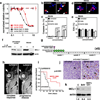A novel retinoblastoma therapy from genomic and epigenetic analyses
- PMID: 22237022
- PMCID: PMC3289956
- DOI: 10.1038/nature10733
A novel retinoblastoma therapy from genomic and epigenetic analyses
Abstract
Retinoblastoma is an aggressive childhood cancer of the developing retina that is initiated by the biallelic loss of RB1. Tumours progress very quickly following RB1 inactivation but the underlying mechanism is not known. Here we show that the retinoblastoma genome is stable, but that multiple cancer pathways can be epigenetically deregulated. To identify the mutations that cooperate with RB1 loss, we performed whole-genome sequencing of retinoblastomas. The overall mutational rate was very low; RB1 was the only known cancer gene mutated. We then evaluated the role of RB1 in genome stability and considered non-genetic mechanisms of cancer pathway deregulation. For example, the proto-oncogene SYK is upregulated in retinoblastoma and is required for tumour cell survival. Targeting SYK with a small-molecule inhibitor induced retinoblastoma tumour cell death in vitro and in vivo. Thus, retinoblastomas may develop quickly as a result of the epigenetic deregulation of key cancer pathways as a direct or indirect result of RB1 loss.
Figures





Comment in
-
Genomics: The path to retinoblastoma.Nature. 2012 Jan 18;481(7381):269-70. doi: 10.1038/481269a. Nature. 2012. PMID: 22258599 Free PMC article.
-
Retinoblastoma: Epigenetic outcome.Nat Rev Cancer. 2012 Jan 24;12(2):80. doi: 10.1038/nrc3222. Nat Rev Cancer. 2012. PMID: 22270947 No abstract available.
-
Retinoblastoma tumorigenesis: genetic and epigenetic changes walk hand in hand.Future Oncol. 2012 May;8(5):525-8. doi: 10.2217/fon.12.41. Future Oncol. 2012. PMID: 22646767
References
-
- Friend SH, et al. A human DNA segment with properties of the gene that predisposes to retinoblastoma and osteosarcoma. Nature. 1986;323:643–646. - PubMed
-
- Hanahan D, Weinberg RA. Hallmarks of cancer: the next generation. Cell. 2011;144:646–674. - PubMed
-
- Hernando E, et al. Rb inactivation promotes genomic instability by uncoupling cell cycle progression from mitotic control. Nature. 2004;430:797–802. - PubMed
Publication types
MeSH terms
Substances
Grants and funding
LinkOut - more resources
Full Text Sources
Other Literature Sources
Molecular Biology Databases
Miscellaneous

